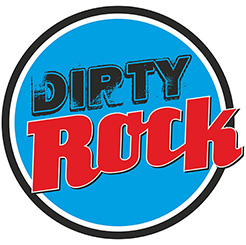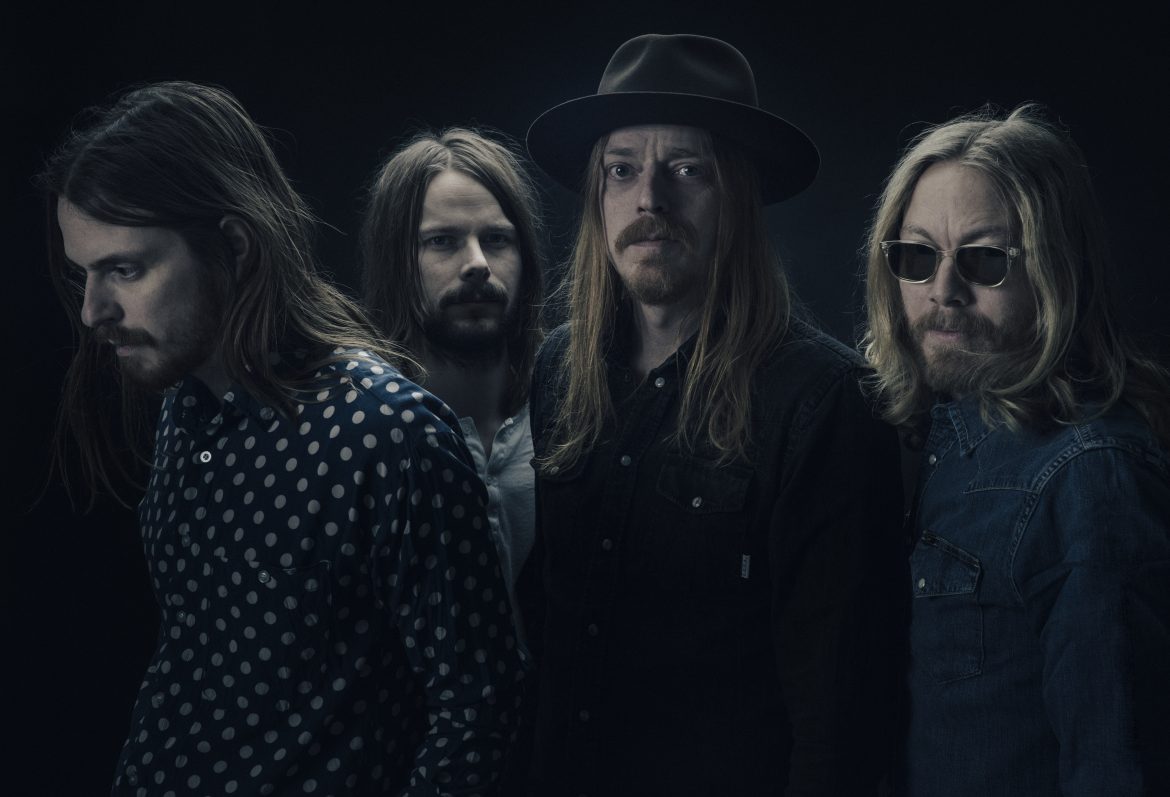Después de terminar su primera gira europea post-pandémica, Graveyard está a punto de aterrizar de nuevo en España. La banda sueca, formada por Joakim Nilsson (guitarra y voz), Jonatan Larocca-Ramm (guitarra), Truls Mörck (bajo) y Oskar Bergenheim (batería) viajará al Kafé Antzokia de Bilbao el 26 de mayo antes de encabezar el cartel del Kristonfest este año en la Sala Paqui madrileña el 27 de mayo, junto con The Obsessed (con el OG Scott ‘Wino’ Weinrich), el trio francés Mars Red Sky y los alicantinos Rosy Finch.
Durante el breve paréntesis entre su gira europea con Kadavar y su paso por la península ibérica, Jonatan La Rocca-Ramm, guitarrista de Graveyard, ha encontrado tiempo para contestar a nuestras preguntas sobre su gira y la producción de su inminente disco nuevo:
(ORIGINAL INTERVIEW IN ENGLISH BELOW)


Dirty Rock: ¡Tenemos MUCHÍSIMAS ganas de escuchar la nueva música que saldrá este otoño! ¿Puedes decirnos algo sobre el próximo álbum? ¿Estáis especialmente orgullosos de algún aspecto del nuevo material?
Jonatan: ¡Gracias! Nosotros también estamos emocionados y muy orgullosos del próximo álbum, pero es difícil saber qué canciones te gustan más antes de tocarlas en directo. Por alguna razón, tardamos en saber cuáles son nuestros temas favoritos. Eso sí, este disco es un poco más lento, pero igualmente lleno de joyitas.
Dirty Rock: En sólo dos años, editasteis dos álbumes que fueron muy aclamados por la crítica (‘Hisingen Blues’ en 2011 y ‘Lights Out’ en 2012), pero lleváis unos cuantos años desde tu quinto y más reciente álbum, ‘Peace’ (2018). De hecho, el primer tema de ese álbum, una explosión sonora llamada «It Ain’t Over Yet» [‘todavía no ha acabado la cosa’] fue un aliciente para vuestros fans, dando a entender que pronto escucharíamos temas nuevos. ¿Hay alguna razón especial que explique el retraso de este último trabajo?
Jonatan: Como bien dices, nos ha llevado tiempo. Nuestra idea era lanzar este disco hace un año más o menos, pero yo, personalmente, tuve un bajón en cuanto a la creatividad durante la pandemia. Todos somos padres de familia y tuvimos que buscar otro trabajo para sostener a nuestras familias mientras grabamos, y luego, uno a uno, fuimos cayendo en la gripe, por lo que, aunque hemos tardado un poco más, ¡valdrá la pena la espera!
Dirty Rock: Todos habéis coincidido en un momento u otro en que vuestro proceso de composición es bastante colectivo y democrático y que todo el mundo está implicado en mayor o menor medida. También habéis admitido que, con cada cambio de formación, el resultado es casi una nueva versión de Graveyard. Por ejemplo, con tu llegada, ‘Hisingen Blues’ destacó por ser un disco más sofisticado, tal vez por los coros añadidos o la segunda guitarra… Luego, después de la (muy esperada) reunión y cuando Oskar se unió a la banda antes de que se editara ‘Peace’, parecía haber una energía renovada que promovió un sonido posiblemente más pesado. Todos seguís siendo amigos y no parece haber habido mala sangre en ningún momento, pero ¿crees que estáis más ‘asentados’ como banda ahora que no han habido cambios en la formación durante algún tiempo?
Jonatan: Siempre hemos sido una banda de buenos amigos, o como minimo, buenos colegas. Los cambios siempre ocurren, nos guste o no, pero nos han llevado hasta aquí y sé que ahora somos mejores que nunca en lo que hacemos. Estoy muy agradecido de formar parte de esto y me considero muy afortunado de tocar música con estos tíos.
En estudio, hemos grabado la mayoría de los álbumes en directo y lanzamos un bootleg oficial hace tiempo, pero ahora podría ser el momento para ese doble álbum en vivo.
Dirty Rock: Para este nuevo álbum, ¿dónde se grabaron las nuevas pistas?
Jonatan: Con el productor e ingeniero de sonido Don Alsterberg en su estudio, Don Pierre Studios, con sede en Gotemburgo. Por otro lado, grabamos un par de pistas en un estudio llamado Silence Studio en Koppom Värmland, también con Don, que hace un gran trabajo juntando todas las piezas, como siempre.
Dirty Rock: Vuestro cuarto álbum de estudio, ‘Innocence & Decadence‘, fue grabado en los estudios legendarios Atlantis Grammafon de Estocolmo (de donde han salido obras maestras de ABBA, the Hives y Opeth, entre otros) con un productor/ingeniero que no venía precisamente del mundo del rock (Johan Lindström). Y, aunque la formación también había cambiado un poco cuando Truls regresó y cambió la guitarra por el bajo, de repente las melodías sobresalían más, se notaba un rollo más bluesero e incluso un guiño a Motown en “Too Much is Not Enough”. Por otro lado, vuestro último álbum, ‘Peace’, fue grabado en Park Studios (también en Estocolmo), pero con un productor diferente (Chips Kiesbye). Este trabajo fue tanto digital como analógico y se usaron muchos equipos antiguos, lo que parecía sacar a relucir el lado más pesado y creativo de la banda. ¿Cuánto afecta el estudio al producto final? ¿Estáis todos igualmente involucrados en el proceso de producción como en la fase de composición?
Jonatan: Todos contribuimos al producto final. Esta vez Joakim y yo hemos escrito un montón, pero nunca sonaría igual si todos no trabajásemos juntos. Truls probablemente hizo la mejor canción del álbum, Oskar es un tren sin parar detrás de la batería y Don ha sido un sostén en el que apoyarse durante todo el proceso.
Dirty Rock: ¿Hubo algún tema que no terminó formando parte del nuevo álbum?
Jonatan: Sí, quedaron algunos fuera; seis para ser exactos. Es posible que aparezcan en un futuro no muy lejano, pero ya veremos qué pasa…
Dirty Rock: En el pasado, habéis insinuado que queríais hacer un disco más ácido/psicodélico. ¿Así va a ser el nuevo disco?
Jonatan: Tiene un poco de todo, pero siempre es muy difícil describir tu propia música. Creo que a la gente ajena de la banda se les da mejor definir nuestra música.

Dirty Rock: Volviendo al tema de equipos, como mencionamos, ‘Peace’ se grabó con unos amplis vintage de mediados de los años 50 y 60. Y para este nuevo álbum, ¿el equipo destaca? Te he visto tocar una Les Paul, y otras veces, una Gibson SG cuando parece que quieres más pegada, y Joakim tiene una hermosa Fender Jaguar. ¿Hay algo novedoso en cuanto al equipo utilizado para grabar el nuevo disco?
Jonatan: Básicamente hemos usado nuestro equipo de siempre para este disco. Joakim tocó con su Gibson ES-330 y yo, mi Gibson SG y mi Les Paul. Usamos unos amplis Marshall Bluesbreakers, Dns y Hiwatt y Joakim usó su Peavey clásico auto-modificado. A veces Truls tocó con su bajo personalizado, hecho por T.P. Custom Guitars y otras veces, su Rickenbacker. Oskar estaba dándole a su batería Ludwig.
Dirty Rock: Vuestra música es un jambalaya perfectamente combinado de todo tipo de música, desde psicodelia, blues del desierto, jazz sueco, rock clásico e incluso soul. Joakim mencionó una vez que «somos el resultado de nuestras influencias» y que había estado escuchando más jazz y artistas como la gran Nina Simone. ¿Os habéis inspirado en diferentes fuentes esta vez, además de los álbumes de rock y heavy metal clásico que os gusta?
Jonatan: Sí, siempre hay muchas influencias diferentes, ya que todos escuchamos una variedad de géneros y todo tipo de música, aunque siempre haya una base cargada de blues y rock. Es difícil explicarlo bien. A veces, parece que la vida misma inspira tanto como cualquier tipo de música.
[En el nuevo disco], diría que son letras más personales y algunas están ahí para que el oyente aplique sus propias experiencias o su propia interpretación de lo que tratan. No hay mucha política, quizás algo de ‘rock pandémico’.
Dirty Rock: Vuestras letras tienden a ser un poco más ‘intelectuales’ que las letras estereotipadas de ‘metal’ o ‘hard rock’. Como habéis dicho alguna vez, “no suelen ser de magos o dragones”. Las letras del álbum ‘Lights Out’ (2012) tenían una carga política significativa. Con todos los conflictos sociales en el mundo actual y teniendo en cuenta que este es vuestro primer álbum desde la pandemia, ¿le habéis dado importancia a las letras como hicisteis en ‘Lights Out’?
Jonatan: Gracias. Diría que son letras más personales y algunas están ahí para que el oyente aplique sus propias experiencias o su propia interpretación de lo que tratan. No hay mucha política, quizás algo de ‘rock pandémico’.
Dirty Rock: Siempre que algo cambie, se topa con los típicos detractores que no quieren que os alejáis del sonido que creen que os representa. ¿Es difícil ignorar ese tipo de ruido o rechazo?
Jonatan: La verdad es que nunca nos hemos sentido presionados a hacer algo para complacer a los demás cuando se trata de nuestra música y hasta ahora, hacerlo así nos ha funcionado. Estamos agradecidos a la gente que disfruta de nuestras canciones.
Dirty Rock: Algo que me encanta de Graveyard es vuestra capacidad de ofrecer un directo diferente cada noche. No solo os limitáis a tocar los temas de los álbumes, tal cual. Se nota que os gusta tocar frente al público. ¿Cómo sois capaces de conectar con gente tan diferente con tantos orígenes diferentes? ¿Habéis notado algo diferente en la forma en la que reaccionamos los fans aquí en España?
Jonatan: España siempre ha sido una pasada para nosotros, pero no hay grandes diferencias en cuanto a nuestro público. Puede ser más tranquilo un domingo que un sábado, por lo que depende más del día de la semana que cualquier otra cosa. Tratamos de mantener viva la música mezclando algo de improvisación de vez en cuando, lo que hace que todo sea más interesante y divertido para mí. A mucha gente le gusta, pero otros quieren que sea exactamente igual que lo que escuchan en las grabaciones. Para mí, es mucho más interesante cuando sucede algo nuevo sobre las tablas.
Dirty Rock: Vuestras canciones son maravillosamente dispares y pueden ser tranquilas y cargadas de emoción, o rápidas y duras. En un directo, ¿qué hacéis para cambiar esa dinámica tantas veces en un mismo set y en un abrir y cerrar de ojos?
Jonatan: Creo que los cambios y las diferentes dinámicas son muy importantes para Graveyard. Sin ellas, no seríamos nosotros. Es algo que ya nos sale de forma natural hoy en día.
Tratamos de mantener viva la música mezclando algo de improvisación de vez en cuando, lo que hace que todo sea más interesante y divertido para mí.
Dirty Rock: Después de más de 15 años haciendo esto, ¿seguís preparándoos para los directos? ¿Tenéis alguna ‘rutina’ que hacéis antes de salir al escenario?
Jonatan: Tuvimos que ensayar un par de veces antes de esta gira europea que acabamos de terminar, ya que hacía un par de años que no giramos. Es importante reunirse como grupo de vez en cuando para mantener la sensación de ser una banda, aunque es posible que no necesitemos practicar tanto como antes. No hay rutinas. Solo intentamos respirar y mantener la calma antes de subir al escenario.
Dirty Rock: Hace un par de años por fin girasteis por Sudamérica. ¿Algún otro lugar al que os gustaría ir que aún no hayáis visitado?
Jonatan: Estaría genial ir a Japón.
Dirty Rock: En los directos que he visto yo, me sorprende lo limpio que suena todo y, sin embargo, me he dado cuenta de que no usáis muchos pedales de distorsión diferentes. ¿Cómo podéis sacar esos sonidos tan desgarradores con unos pedales tan aparentemente ‘simples’? ¿Influyen a la hora de crear ese sonido tan característicamente vuestro?
Jonatan: Tanto Joakim como yo preferimos conectar la guitarra directamente al ampli y con la menor cantidad de efectos posible. Es un poco más difícil tocar de esa manera, pero suena mejor.
Dirty Rock: Estáis a punto de terminar vuestra gira junto a Kadavar y luego iréis a Bilbao antes de encabezar el Kristonfest en Madrid, junto a los pioneros The Obsessed, el trio francés Mars Red Sky y los españoles, Rosy Finch. Tenemos muchas ganas de teneros de vuelta aquí en España, especialmente por vuestros directos tan épicos. Habéis grabado discos en directo en el estudio para tratar de capturar esa intensidad, pero ¿tenéis pensado editar un álbum en vivo?
Jonatan: Tenemos muchas ganas de volver también. En estudio, hemos grabado la mayoría de los álbumes en directo y lanzamos un bootleg oficial hace tiempo, pero ahora podría ser el momento para ese doble álbum en vivo.
Dirty Rock: Para terminar, la banda está cerca de cumplir 2 décadas… Habéis sido galardonados con 2 premios Grammy suecos, tenéis una base de seguidores muy leales, dejasteis vuestros trabajos ‘normales’ hace ya tiempo para dedicaros por completo a la música, sois cabezas de cartel en fechas y festivales importantes como el legendario DesertFest en Londres… ¿Hacia dónde irá Graveyard a partir de ahora? ¿Tenéis algún objetivo a corto para la banda?
Jonatan: Creo que lo que realmente queremos todos es escribir y tocar música. Además, es el mejor trabajo que puedes desear. También nos permite pasar más tiempo con nuestros hijos y familias que si tuviéramos un trabajo ‘normal’, incluso cuando hay que estar de gira durante semanas. Mientras la gente disfrute de lo que hacemos y mientras nosotros disfrutemos de lo que hacemos, seremos felices.
GRAVEYARD en las redes: Instagram, YouTube, Facebook, Spotify
–ORIGINAL INTERVIEW IN ENGLISH–
Dirty Rock: We’re all REALLY excited about the new music that’s coming out this Fall! Is there anything you can tell us about the upcoming album? Is there any aspect of the new material that you’re most proud of?
Jonatan: Thanks, we’re excited as well. We’re proud of the upcoming album but it’s hard to know what songs you’re into the most before playing them live. Somehow, it takes a while to know which are your own personal favorites. As for the album, this one is a little slower, but still full of gems.
Dirty Rock: You put out two incredible and critically-acclaimed albums in the course of just two years (‘Hisingen Blues’ in 2011 and ‘Lights Out’ in 2012), yet it’s been a while since your 5th album, ‘Peace’ was released, in 2018. In fact, the opening track on that album instilled the faith in all of us fans that new music would be coming soon: we’ve been waiting patiently ever since you taunted us with that explosion of sound called “It Ain’t Over Yet”. Is there any specific reason as to why your 6th album has taken longer to be released?
Jonatan: As you said, it’s been a while. We planned to release this one about a year earlier but for me, personally, the creativity slowed down during the pandemic as well. We are all parents and had to do other work to sustain our livelihood while recording and take turns getting the flu, so even if it was a little slow getting it done, it will be worth the wait!
Dirty Rock: You’ve all concurred at one point or another that your songwriting process is pretty collective and democratic and that everyone is involved to a lesser or greater extent. You’ve also kind of admitted that with each lineup change, the result is a somewhat different version of Graveyard. For example, upon your arrival, ‘Hisingen Blues’ seemed more technically mature, perhaps because of the extra vocal backups or the added guitar… Then, when the band reunited and Oskar came on board before ‘Peace’ was released, there seemed to be a renewed energy that spawned a possibly heavier sound. Even throughout the changes, you’ve all remained buddies and there doesn’t seem to have been any bad blood at any moment, but do you feel more established as a band now that there have been no lineup changes for a while?
Jonatan: We’ve always been a band of good friends, both far and close. Whether we like it or not, changes come, and I know that we are better at what we do now than ever before. I’m very thankful to be a part of it and consider myself very lucky to be playing music with these guys.
Dirty Rock: For this new album, where were the new tracks laid down?
Jonatan: We recorded this album with Don Alsterberg as producer and sound engineer in his studio Don Pierre Studios, based in Gothenburg. We also laid down a couple of tracks in a studio called Silence Studio (in Koppom Värmland), also together with Don, who has been doing a great job putting all the pieces together, like always.
Dirty Rock: Your 4th studio album, ‘Innocence & Decadence’ was recorded at the historical Atlantis Grammafon studios in Stockholm (legendary for producing ABBA, the Hives and Opeth) with a producer/engineer (Johan Lindström) who didn’t exactly come from the rock world. And although the lineup also changed a little when co-founder Truls came back and changed the guitar for the bass, the melodies suddenly stuck out more, there was more of a blues groove and even a nod to Motown in “Too Much is Not Enough”. Then, your last album, ‘Peace’, was recorded at Park Studios [also in Stockholm] with a new producer (Chips Kiesbye). It was both digital and analog and a lot of vintage gear was used, which seemed to bring out the heavier, more creative side of the band. How much does the studio affect the final product? Are you all involved in the production process as much as in the composition stage?
Jonatan: Everyone contributes to the final product, this time Joakim and I have been writing a bunch, but it would never sound the same without all of us working together. Truls probably came up with the best song on the album, Oskar is a train swinging behind the kit and Don has been a rock to lean on throughout the process.
Dirty Rock: Were there any songs played in the sessions that weren’t used for the album?
Jonatan: Yes, a few were left out, six of them to be exact. They might show up in a not so distant future, but we’ll see what happens.
Dirty Rock: In the past, you’ve hinted at making a more acid/psychedelic record. Is this it?
Jonatan: It has a little bit of everything but it’s always very hard to describe your own music. I think people outside the band are better at doing that.
Dirty Rock: Going back to gear, as we said, ‘Peace’ was recorded with a lot of vintage amps from the mid-50s and 60s. What about this new album? I’ve seen you play a Les Paul and a Gibson SG when you more of a punch, and Joakim has a gorgeous Fender Jaguar. Did you use any cool gear on the new record that you haven’t recorded with before?
Jonatan: We mostly used our regular equipment on this record. Joakim used his Gibson ES-330 and I used my Gibson SG and my Les Paul. The guitar amps we used were Marshall Bluesbreakers, Dns and Hiwatt. Joakim also used his self-modified Peavey classic amp and Truls played both his own signature bass built by T.P. Custom Guitars and his Rickenbacker. Oskar was hitting his Ludwig kit.
Dirty Rock: Your music is a perfectly-meshed jambalaya of all kinds of music from psychedelia, desert blues, Swedish jazz to classic rock and even soul. Joakim once mentioned that “We are the result of our influences” and that he had been listening more to jazz and artists such as the late, great Nina Simone. Have you pulled inspiration from different sources this time, apart from the heritage classic rock albums you love?
Jonatan: Yes there will always be a lot of different kind of influences since we all listen to a variety of genres and all kinds of music, even though the foundation might be loaded with blues and rock. It’s hard to be specific and sometimes it feels like life itself inspires just as much as other music.
Dirty Rock: Your lyrics tend to be a little more ‘intellectual’ than the stereotypical ‘metal’ or ’hard rock’ lyrics. As you’ve said in the past, you “don’t sing too much about wizards or dragons.” Your 2012 album ‘Lights Out’ was quite politically-charged. With all the social unrest in the world these days and keeping in mind this is your first album since the pandemic, have you placed importance on the lyrics like with ‘Lights Out’?
Jonatan: Thanks. I would say it has more personal lyrics and some are there for the listener to apply their own experiences or their own interpretation of what it’s all about. It’s not very political, maybe somewhat ‘pandemic rock’.
Dirty Rock: Whenever anything changes, you’ll always come across the naysayers who don’t want you to step away from the original sound they have come to love. Is it hard to ignore that kind of noise or pushback?
Jonatan: To be honest, we’ve never felt pressured to do something to please others when it comes to our music and it’s been a good way of doing it so far. We’re just thankful for the people who enjoy our songs.
Dirty Rock: One of the aspects that I love most about Graveyard is your capacity to give us a different show each and every time. You don’t just play straight off your albums. You’re definitely a touring band and obviously love playing in front of live audiences. How do you connect with so many different audiences from so many different backgrounds? Do the crowds here in Spain stick out from the rest in any way?
Jonatan: Spain has always been great for us but it’s no huge differences between our crowd. It might be slower on a Sunday than on a Saturday so it depends more on what weekday it is. We try to keep the music alive by mixing in some improvisation here and there which makes it more interesting and more fun to me. A lot of people like it and others want it to be more exactly like the albums. To me, it’s way more interesting when something new is happening in the songs.
Dirty Rock: Your songs are so incredibly diverse and go from soft and emotionally-charged to fast and hard, in a heartbeat. Is it difficult to change that dynamic so quickly on stage? How do you go from up to down and back again so many times in one set?
Jonatan: I think the dynamic differences are very important for Graveyard, without them, we wouldn’t be ourselves. It comes naturally nowadays.
Dirty Rock: Do you still prepare for shows after over 15 years of doing this? Do you have any ‘routines’ that you do before you go out on stage?
Jonatan: We had to rehearse a few times before this European tour we just came back from since it was a couple of years since we did one. It’s important to get together as a group now and then to keep up the feeling of being a band, even though we might not need as much practice as we used to. No routines except to breathe and keep calm before hitting the stage.
Dirty Rock: A couple years ago you finally went to South America, any other place you’d like to go to that you haven’t visited yet?
Jonatan: Japan would be nice.
Dirty Rock: When I’ve seen your shows, one thing that surprises me how is clean everything sounds and yet, I’ve noticed that you don’t seem to use a lot of different distortion pedals. How can you get such rich sounds with such a ‘simple’ pedal board? Is there anything special about your pedals or is it the way you use them when you create your signature ‘Graveyard sound’?
Jonatan: Both Joakim and I prefer the guitar plugged straight into the amp and as few effects as possible. It’s a little more of a struggle playing that way, but it sounds better.
Dirty Rock: You’re about to finish a tour alongside Kadavar and getting ready to head to Bilbao before headlining at Madrid’s Kristonfest, alongside the OGs, The Obsessed, the French heavy-psych trio, Mars Red Sky and Spain’s very own, Rosy Finch. We’re so excited to have you back, especially because your live shows are so epic. You’ve recorded live in the studio to try to capture that intensity, but have you had any thoughts for a truly live album?
Jonatan: We’re excited to come back as well! We’ve recorded most albums live and released an official bootleg record a while ago but it might be time for that double live album now.
Dirty Rock: Finally, you’re creeping up to the 2 decade mark, where will Graveyard go from here? You’ve been awarded with 2 Swedish grammys, you have a loyal fan base, all of you quit your day jobs a while ago to fully dedicate yourselves to your music, you’re headlining festivals and playing at the famed Desert Fest in London… What’s the band’s ultimate goal?
Jonatan: I think we all just want to write and play music – it’s the best job you can have and it also gives us more time with our children and families than if we had a day job – even if we have to be gone for a few weeks at a time. As long as people enjoy what we do and as long as we enjoy what we do, we are a happy gang.


1 Comentario